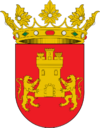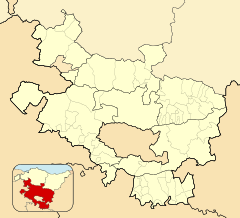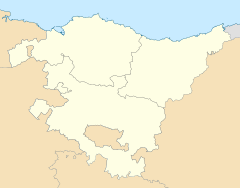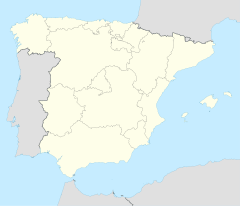Zuia facts for kids
Quick facts for kids
Zuia
Zuya
|
||
|---|---|---|
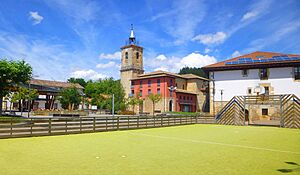
Church of San Miguel in Murgia, Zuia
|
||
|
||
| Country | ||
| Autonomous community | ||
| Province | Araba/Álava | |
| Eskualdea / Comarca | Gorbeialdea | |
| Area | ||
| • Total | 122.49 km2 (47.29 sq mi) | |
| Elevation | 617 m (2,024 ft) | |
| Population
(2018)
|
||
| • Total | 2,313 | |
| • Density | 18.883/km2 (48.907/sq mi) | |
| (INE) | ||
| Demonym(s) | Zuiar | |
| Time zone | UTC+1 (CET) | |
| • Summer (DST) | UTC+2 (CEST) | |
| Postal code |
01430
|
|
Zuia (also called Zuya in Spanish) is a cool town and area in northern Spain. It's located in the Álava province, which is part of the Basque Country. Zuia is known for its beautiful nature and rich history!
Contents
Zuia's Past: A Look at History
The first time the Zuia Valley was written about was in a document from the year 1025. This old paper, called the Reja de San Millán, is kept safe in a monastery. It talks about how much iron different areas had to give to a religious place. Zuia was mentioned as giving nine bars of iron.
In 1752, the king said "yes" to building a new road through the Zuia valley. This road was very important because it made it easier to travel between two big cities, Vitoria and Bilbao. The town hall also got bigger in 1763. The new town hall building was finished in 1767.
Exploring Zuia's Geography
Zuia is a municipality that shares borders with other areas. It touches the province of Biscay and several other towns in Álava. A big part of the Gorbea mountain area is inside Zuia. This includes some really tall mountains like Gorbea (1,482 meters high!), Nafakorta, Burbona, and Berretín.
Many rivers start here, like the Baias, Ugalde, and Larreakorta. These rivers flow from north to south, carving out deep valleys in Zuia.
Amazing Forests and Trees
Even though some of the original forests in Gorbeia have been cut down, you can still find beautiful beech woods. These are in places like Berretín and Arlobi. There are also oak trees near the Baias river in villages like Bitoriano and Ametzaga.
The Peñas de Oro/Atxabal and Ganalto mountains surround the Zuia Valley. They have lovely patches of beech and oak trees on their sides. These spots offer amazing views, especially over Oro. Oro is a special place because of its unique plants, interesting rocks, and the old Sanctuary of Oro.
Zuia's Economy: How People Make a Living
For a long time, people in Zuia mostly worked in farming and raising animals. The first factories started appearing in the 1900s. Today, Zuia is becoming more of a place where people live and enjoy the quiet life.
Farming and Food
Even though farming isn't the main job anymore, there are still important sheep and cattle farms. Some farms in Sarria even make Idiazabal cheese, which is very tasty! Beekeeping, which is raising bees for honey, is also growing. You can learn all about honey at the Honey museum in Murgia.
Industry and Services
Zuia has industrial areas in Murgia and Islarra, where different businesses are located. But the biggest part of Zuia's economy is services. This means things like shops, restaurants, and hotels. Tourism and outdoor sports are very popular here. Zuia has a long history of welcoming visitors.
Murgia is the main center for services. It has many shops, cafes, restaurants, and a sports center. Other villages also offer services. For example, you can find farmhouses and cottages to stay in Lukiano and Markina. There's even a golf club in Altube!
Villages of Zuia
The municipality of Zuia is made up of several charming villages:
- Ametzaga
- Aperregi
- Aretxaga
- Bitoriano
- Domaikia
- Gilierna-Guillerna
- Jugo (Itzugo)
- Lukiano
- Markina
- Murgia, which is the capital of Zuia
- Sarria
- Zarate-Zárate
- Ziorraga
Images for kids
See also
 In Spanish: Zuya para niños
In Spanish: Zuya para niños
 | Janet Taylor Pickett |
 | Synthia Saint James |
 | Howardena Pindell |
 | Faith Ringgold |


